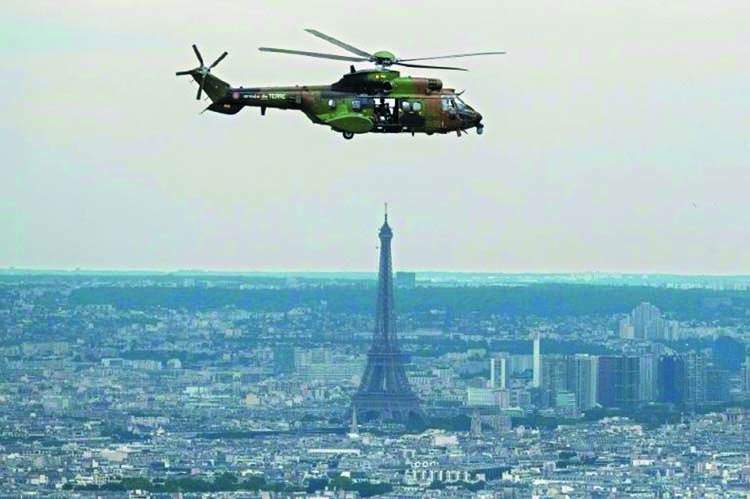Macron to show off Euro defense cooperation at Paris parade

French President Emmanuel Macron will on Sunday (Jul 14) seek to showcase Europe's defence capabilities by putting European military cooperation at the heart of a Bastille Day parade at a time of growing tensions with the United States.
Key EU leaders, including German Chancellor Angela Merkel and British Prime Minister Theresa May, are expected to join Macron to watch the annual parade down the Champs Elysees that marks the July 14, 1789 storming of the Bastille fortress in Paris in the French Revolution.
Closer European defense cooperation has been one of Macron's key foreign policy aims, and the president shows no sign of wavering despite growing political turbulence in Germany and Britain's looming exit from the European Union.
At the 2017 parade, Macron's guest of honor was the freshly-inaugurated US President Donald Trump as the young French leader sought to take the initiative by forming a bond with his counterpart.
Trump was so taken by the event that he ordered a similar military parade to take place in Washington for the Jul 4 celebrations. But since then ties between Trump and Macron have soured, with tensions over the US pullout from the Paris climate accord and Iran nuclear deal, as well as France's new law for a tax on digital giants.
Macron, who pushed the idea of the European Intervention Initiative (E2I) to undertake missions outside of existing structures like NATO, said that European defense cooperation was crucial.
"Never, since the end of World War II, has Europe been so important," Macron said in a statement ahead of the Bastille Day parade.
"The construction of a Europe of defense, in connection with the Atlantic alliance whose 70th anniversary we are celebrating, is a priority for France," he added.
Forces from all nine countries taking part alongside France in the E2I - including Britain and Germany - will be represented at the parade.
A German A400M transport plane and a Spanish C130 will take part in fly-bys at the parade, as well as two British Chinook helicopters.
The Chinooks are a major symbol of British-French defense cooperation even as Brexit looms, with Britain deploying three of the aircraft for France's operation in the African Sahel region.
The three helicopters and almost 100 service personnel have been deployed to the French-led operation in Mali since 2018. London delighted Paris by announcing that their mission would be extended.
Also present will be members of the 5,000-strong Franco-German Brigade (BFA), which was created in 1989 as a symbol of postwar unity between France and Germany, and celebrates its 30th anniversary this year.
But in a sign of the continued importance of NATO to Macron, its Secretary General Jens Stoltenberg will be attending.
For Britain's May, the parade will be one of her last major engagements before stepping down as prime minister after failing in her stated goal to implement Brexit.
The demeanor of Merkel, who is battling to keep her grand coalition together at home, will again be under scrutiny after she suffered three episodes of shaking at official events in recent weeks.
Some 4,300 members of the armed forces, 196 vehicles, 237 horses, 69 planes and 39 helicopters will be mobilized for the event in the heart of the French capital.
French pilots, who have rehearsed the spectacular air display for the last six months, know that there is no room for error in their aerial choreography.
"It needs to be done in the most precise way. The whole game is to respect the ultra-precise timing, more or less three seconds," a French air captain named Bertrand who will take part in the parade told AFP.
Military top brass will be hoping there is no repeat of the glitch last year when one of the planes involved in the aerial display left a red trail instead of blue, ruining the image of the French flag in the sky.
